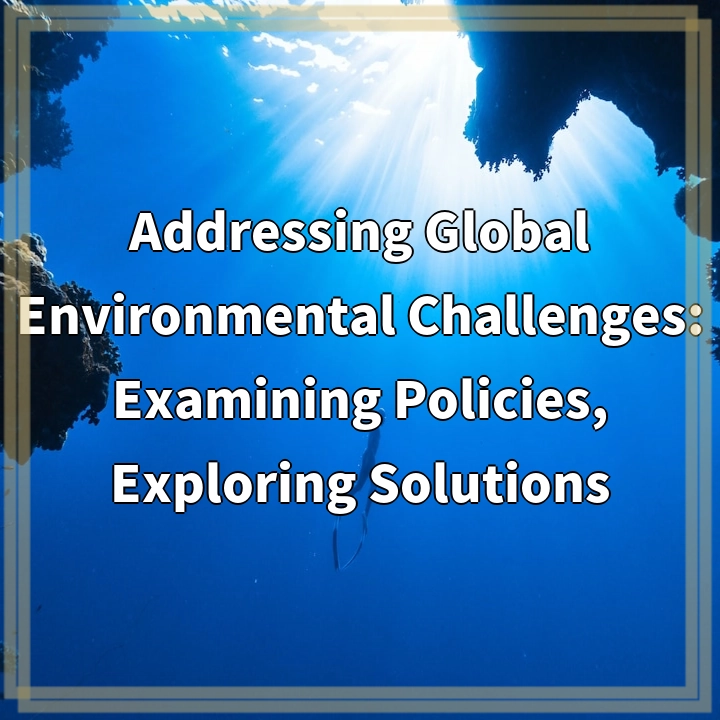
What it is:
Addressing Global Environmental Challenges: Examining Policies, Exploring Solutions
Addressing global environmental challenges requires a comprehensive understanding of the policies in place and exploring potential solutions. It involves analyzing the various measures taken by governments, international organizations, and local communities to tackle pressing environmental issues.
By examining global environmental policies, we can gain insights into the frameworks and strategies adopted by different stakeholders to mitigate climate change, conserve biodiversity, manage waste, promote sustainable development, and address other critical environmental issues.
Real-world problems:
1. Climate Change:
One of the most significant global environmental challenges is climate change. Rising temperatures, extreme weather events, and melting ice caps have serious implications for ecosystems, livelihoods, and human health. Policy efforts aim to reduce greenhouse gas emissions, adapt to changing climatic conditions, and foster sustainable practices.
2. Deforestation:
Deforestation is a pressing issue that leads to habitat destruction, loss of biodiversity, and contributes to climate change. Policies focus on curbing illegal logging, promoting sustainable forestry practices, and supporting reforestation initiatives to restore and conserve vital forest ecosystems.
3. Pollution and Waste Management:
Pollution, whether from industrial activities, improper waste disposal, or air and water contamination, poses significant threats to the environment and human health. Policies aim to reduce pollution levels, improve waste management systems, and promote the use of clean technologies to minimize the ecological impact.
4. Loss of Biodiversity:
The loss of biodiversity is an alarming problem caused by habitat destruction, overexploitation, and invasive species. Policies focus on safeguarding ecosystems, protecting endangered species, and promoting sustainable practices in agriculture, forestry, and fisheries to preserve biodiversity and the services it provides.
5. Resource Depletion:
The depletion of natural resources, such as water, minerals, and fossil fuels, is a significant concern for sustainable development. Policies aim to promote efficient resource use, encourage recycling and renewable energy adoption, and support responsible extraction practices to mitigate the impact of resource depletion.
6. Environmental Injustice:
Environmental challenges often exacerbate social inequalities, with marginalized communities facing disproportionate environmental burdens. Policies seek to address these injustices by promoting environmental justice, inclusive decision-making processes, and equitable access to resources and opportunities.
Exploring Solutions:
While the world faces complex environmental challenges, there are numerous innovative solutions being pursued. These encompass a range of strategies, such as transitioning to renewable energy sources, implementing sustainable land and water management practices, adopting circular economy models, empowering local communities, and raising awareness about the importance of environmental conservation.

Solutions to Addressing Global Environmental Challenges:
1. Transition to Renewable Energy Sources
Shifting away from fossil fuels and embracing renewable energy, such as solar, wind, and hydropower, can significantly reduce greenhouse gas emissions and combat climate change.
2. Implement Sustainable Land and Water Management
Adopting sustainable agricultural practices, promoting reforestation efforts, and ensuring responsible water management can help preserve ecosystems, prevent land degradation, and protect biodiversity.
3. Embrace Circular Economy Models
Transitioning to a circular economy that focuses on reducing waste, recycling materials, and promoting resource efficiency can help minimize pollution, conserve resources, and reduce environmental impact.
4. Empower Local Communities
Engaging and empowering local communities in decision-making processes, providing access to education and resources, and supporting community-led conservation initiatives can help address environmental challenges and promote sustainability.
5. Raise Awareness and Advocacy
Increasing public awareness about the importance of environmental conservation, promoting sustainable lifestyles, and advocating for stronger environmental policies can foster a broader movement towards positive change.















